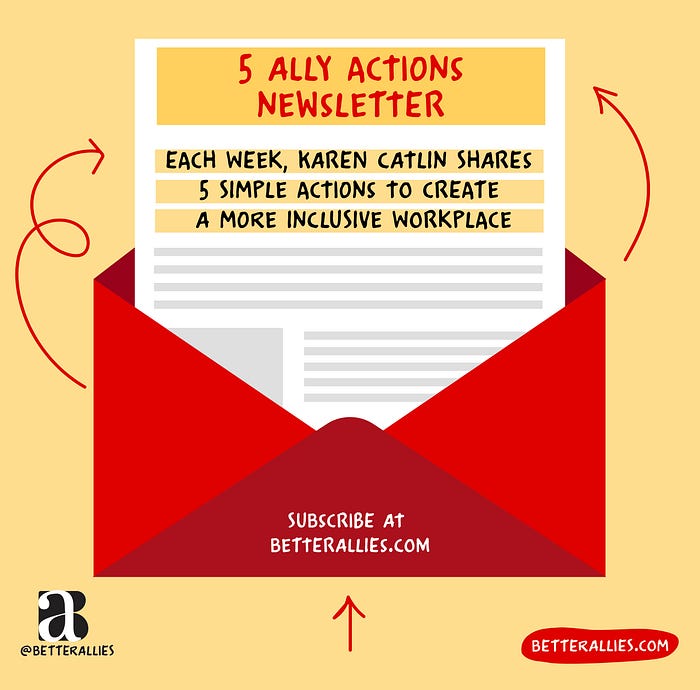Don’t Silence These Words, and Other Actions for Allies
Each week, Karen Catlin shares five simple actions to create a more inclusive workplace and be a better ally.

1. Don’t silence these words
Last weekend, The New York Times published These Words Are Disappearing in the New Trump Administration. The list includes 199 terms, including words I say multiple times every day. Things like accessible, privileges, inclusive leadership, discriminatory, advocate, pronouns, diverse backgrounds, inequalities, race, Black, Latinx, LGBTQ, and women. And my favorite? Allyship.
The article explains, “The above terms appeared in government memos, in official and unofficial agency guidance and in other documents viewed by The New York Times. Some ordered the removal of these words from public-facing websites, or ordered the elimination of other materials (including school curricula) in which they might be included. In other cases, federal agency managers advised caution in the terms’ usage without instituting an outright ban.”
The Times also noted, “The list is most likely incomplete.”
The effort to erase these terms has striking similarities to George Orwell’s warnings about language control in his novel 1984. Orwell explored how restricting and manipulating language — what he termed Newspeak — could reshape public thought, limit dissent, and shrink the capacity for critical thinking. In one scene, Orwell wrote, “Has it ever occurred to you, Winston, that by the year 2050, at the very latest, not a single human being will be alive who could understand such a conversation as we are having now?”
Author and scholar Ibram X. Kendi, PhD, shared the list on social media with the message “Their silencing must be our speaking. Words to encourage in our homes, institutions, and neighborhoods.”
Let’s heed his call and become the voices that these words need.
(Thanks to subscriber Jill F. for asking me to address this NYT list.)
Share this action on Bluesky, LinkedIn, Instagram, Threads, or YouTube.
2. Frame DEI work around anti-discrimination laws
If you work in education, you are probably well aware of the “Dear Colleague” memo that the Department of Education Office of Civil Rights sent to educational institutions receiving federal funds. It explained they must cease using race preferences and stereotypes as a factor in their admissions, hiring, promotion, compensation, scholarships, prizes, administrative support, sanctions, discipline, and beyond.
The result? Many are dissolving DEI departments, canceling DEI initiatives, and scrubbing DEI terms from their websites.
It’s also happening in the business sector, especially in corporations that have government contracts.
Yet, as I wrote in last week’s newsletter, preserving anti-discrimination efforts is still critical. In addition to feeling like a moral imperative for many of us, these programs are the first line of legal defense for organizations to defend themselves from discrimination lawsuits.
Case in point? UC Berkeley recently responded to the Trump administration’s threat to withdraw federal funding by citing … wait for it … DEI initiatives.
“In the statement, administrators cited the Chancellor’s Advisory Committee on Jewish Student Life and Campus Climate, as well as the Antisemitism Education Initiative to train new students, residence hall staff and campus government leaders how to recognize bias against their Jewish peers.” SF Chronicle
Let’s all strive to position our initiatives to create more inclusive workplaces around existing anti-discrimination laws. E.g.,
- Title VII of the Civil Rights Act, which prohibits workplace discrimination.
- The Equal Pay Act, which requires fair wages.
- The Americans with Disabilities Act (ADA), which ensures accessibility.
3. Celebrate wins
Here’s a suggestion in honor of Women’s History Month.
As I learned in Woman of Influence: 9 Steps to Build Your Brand, Establish Your Legacy by my friend Jo Miller, women can face backlash when they advocate for themselves and talk about their achievements. This behavior goes against cultural expectations for women, so people of all genders tend to react negatively to it.
Yet, research from Catalyst shows that women need to talk about their accomplishments to be perceived as competent.
To combat this “damned if you do, doomed if you don’t” conundrum, Miller recommends creating a culture where accomplishments are regularly recognized and celebrated. Doing so can normalize it for everyone, not just women, and it’s a responsibility we all share in fostering a supportive and inclusive workplace.
Consider adding “Humble Brags” as a regular agenda item during staff meetings, creating an online forum for sharing wins, or adding a section to an employee newsletter to give shout-outs.
4. Be a “brain friend”
In her powerful TEDx talk, Why is it that some people just ‘can’t get it together’?, Kristen Pressner describes that, for some reason, her tried-and-true approaches to getting things done didn’t work for her family, and she couldn’t figure out why. She was understandably frustrated.
Pressner realized that “in my relentless attempts to help (them), I was making it worse because I was going about it all wrong for how their brains operate.” Something she realized only after her family members were diagnosed with ADHD.
As a neurotypical person, she realized she prioritizes tasks based on importance. Her family? Based on interest and other epiphanies.
On her journey to learn how to best support her family, tap into their talents, and help them thrive, she realized she had to shift her approach to work with how their brains operate. It comes down to being curious, non-judgemental, and supportive of what brings out their best. She calls this being a “Brain Friend.”
And given that 15–20% of the general population is believed to be neurodivergent, this learning also has far-reaching implications in our workplaces.
Recognizing different neurotypes and engaging in a brain-friendly way ultimately means unleashing the incredible and unique gifts people bring to work every day.
5. Community Spotlight: Review auto-generated video transcripts
This week’s spotlight on an ally action from the Better Allies community is from Eric Schultz, who wrote,
“At the conclusion of a mentoring program at my organization, the mentees are asked to record a video that documents their capstone project. The software used to record the videos has a feature that automatically generates a transcription. I’ve often found that this feature is subject to errors, especially when transcribing names and technical terms.”
Schultz added, “Fortunately, the tool supports editing the transcription for accuracy, which makes the presentation more accessible to a wider audience.”
What great advice for anyone who auto-generates transcripts or video captions. Let’s all take the time to review them for accuracy.
If you’ve taken a step towards being a better ally, please reply to this email and tell me about it. And mention if I can quote you by name or credit you anonymously in an upcoming newsletter.
* Podcast drop
Please join Jennifer Brown and me for the latest episode of the Will To Change podcast: A Decade of Better Allies: Karen Catlin on Evolution, Resilience and the Continuing Work of Change.
We celebrated the 10th anniversary of my Better Allies initiative, from its humble beginnings as an anonymous Twitter account to a comprehensive movement with four published books. We discussed the significant milestones that have shaped conversations around inclusion, from “Lean In” to the racial reckoning of 2020 to the rise of AI.
While we recorded this episode in October, before the US presidential election that changed everything, our conversation remains relevant. We reflected on the courage required to learn in public, the importance of resilience when making mistakes, and why vulnerability is essential for authentic leadership.
That’s all for this week. I wish you strength and safety as we all move forward.
Karen Catlin (she/her), Author of the Better Allies® book series
pronounced KAIR-en KAT-lin, click to hear my name
Copyright © 2025 Karen Catlin. All rights reserved.
Being an ally is a journey. Want to join us?
- Follow @BetterAllies on Bluesky, Instagram, Medium, Threads, or YouTube. Or follow Karen Catlin on LinkedIn
- This content originally appeared in our newsletter. Subscribe to “5 Ally Actions” to get it delivered to your inbox every Friday
- Read the Better Allies books
- Form a Better Allies book club
- Get your Better Allies gear
- Tell someone about these resources
Together, we can — and will — make a difference with the Better Allies® approach.


